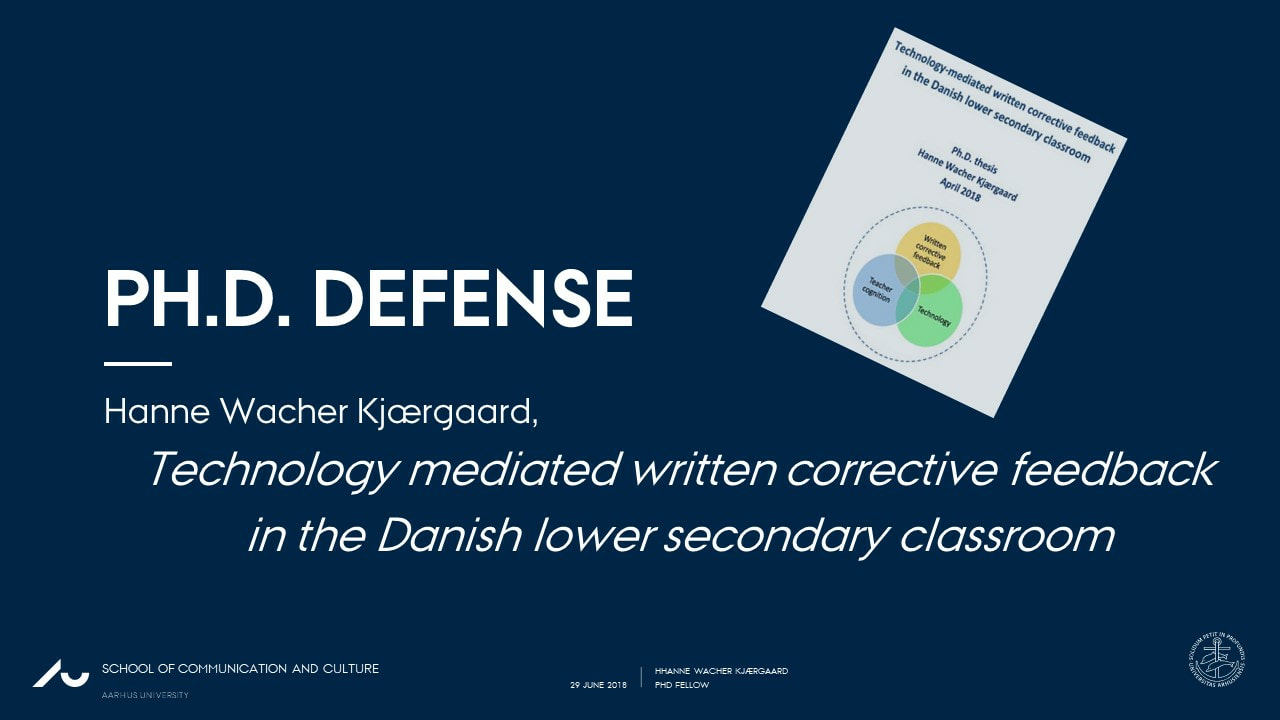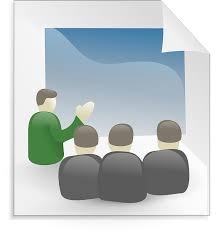
Finally submitted my thesis on 3 April 2018. Defense took place on 29 June 2018 - they let me get away with it, and what a relief!
Thesis can be downloaded HERE
Thesis can be downloaded HERE
 Finally submitted my thesis on 3 April 2018. Defense took place on 29 June 2018 - they let me get away with it, and what a relief! Thesis can be downloaded HERE  After a conference and presentation at EduLearn in Barcelona in July, a summer of much work on student data, and a good EUROCALL conference in Southampton, meeting with others who work on ICT-mediated feedback for language learning, I am now settling in for the last 6-month sprint, aiming for completion of my project on 1 Mar 2018. Not that far off - and tons of work to be done! Visit the Presentations and papers section to see more news... Thesis seminar over and done with, data analysis started.
Some data are quantitative (student questionnaires), some are qualitative (interviews etc.). Developing codes for analyzing the qualitative data - both inductive codes and deductive codes stemming from the various theories I work with - and learning how to use NVivo to code and keep some sort of overview. Interesting patterns show when looking at the students... looking forward to being able to write up my analyses!  Thesis seminar (~ mock defense) to be held in May in the context of the Ph.D. program for Language, Linguistics, and Cognition. External "opponent": Birgit Henriksen, University of Copenhagen. On the agenda: 1. A 30-minute presentation by me 2. 30 minutes of discussion with the external opponent 3. 30 minutes of discussion with the rest of the audience (supervisors, other Ph.D. students, other interested members of staff at the university). Writing away at theoretical chapters -
Enjoying digging even deeper into both language acquisition theories and feedback research. Getting there! Have greatly enjoyed my research stay at UVic, meeting wonderful people, having interesting conversations about my project, about languages and linguistics, learning about teaching and learning here, going to classes with kind colleagues who have taken me in.
Undergraduate students seem to struggle with many of the same problems in Canada as in Denmark when it comes to e.g. syntax and phonetics - but ways of dealing with various subjects differ to some degree, just as evaluation procedures do. Interesting discussions about this! Meeting other Ph.D. and M.A. students has also been a pleasure and an enriching experience. And the enthusiasm with which first-nation languages are being studied, revived, and taught is amazing. Gave a presentation of my project and some preliminary results at a Linguistics Dept. Colloquium. Great comments and questions from an interested audience, who managed to show up despite very short notice! Greatly appreciated :-) Will be returning to Denmark in a week - project has progressed with much reading and writing during the past two months! Many thanks to UVic, Linguistics Dept., and Hossein Nassaji for having me here! Enjoying a research cum study visit at University of Victoria, B.C., Canada.
Have been made to feel extremely welcome here, not least due to the helpfulness of administrative staff! Have met many nice people and am enjoying conversations with them all. My host is Hossein Nassaji, whose extensive research on feedback is impressive. Conversations with Hossein as well as other members of the Dept. of Linguistics, with Martin Holmes in Digital Humanities, and with Catherine Caws in the French Dept. give lots of insight! My initial survey, which close to 300 Danish EFL teachers answered, has now formed the basis of an article on the feedback practices of Danish lower-secondary EFL teachers. The article also claims various general advantages of using technology over pen and paper for this task. Find a link to the article under Presentations and Papers.
All my wonderful teachers have now spent most of a school year working with feedback provision through technology. This means that they have used the dedicated program for 4-5 papers. At a first glance, it seems that their practices have changed quite a bit in comparison to what they did without the technology, but a more detailed analysis will show how and to what extent - and not least how they feel about it. Now whatøs left is the final or endline interviews with teachers and selected students - and a final questionnaire to be given out to the students.
Now the three classes have worked with a number of papers getting their feedback through a file generated by the selected program. We have had some technical issues, but teachers have been brave and patient, and we have managed to solve things - not always in the most elegant way, but we - or rather teachers - managed!
Looking forward to a half-way interview with teachers to see if we need to change everything and to learn what their first impressions are - how do they feel that their practices are being affected? |